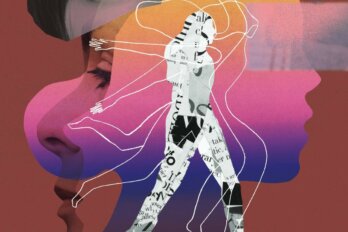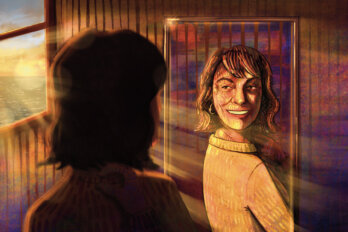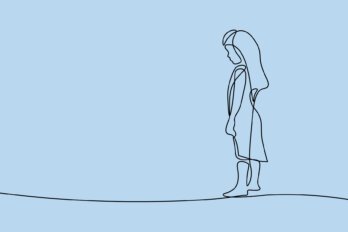M y husband, Dave, and I were on a family road trip, heading home after visiting relatives in Nova Scotia. We landed in a motel in New Brunswick. After a long drive and a dip in the swimming pool, the room resembled a crime scene, strewn with two wet boys, open suitcases, bathing suits, and hamburger wrappers. Dave had collapsed, belly up, on the bed. A teddy bear and my younger son, Max, sat in the middle of the mess.
I watched Ben, the older one, wrestle his wet legs into a pair of sweatpants. It was an admirable effort, and once he was finished, I noticed the pant legs were too short. He had grown so much over that summer—he was now twelve years old—that the cuffs and his ankles had parted ways. I wondered if Dave would ever notice short pant legs. Doubtful. I had a thought, almost teasing myself, that I had to stay alive until the boys were full sized or else their ankles would be forever exposed.
Max was almost the same age I had been when my dad told me he was dying. Max had large, round eyes, and when he asked me a question about the future, he would stare and breathe heavily until I gave him an answer. I wasn’t only a mother; I was the source of everything certain. I had a new appreciation for how brave my dad had been to tell me he was dying while looking into his sweet child’s face. It was a painful thought, hot and sore. I tried to avoid it.
I was about to take a hard-won shower when I turned to look in the mirror. There was a black spot on the back of my shoulder.
I wasn’t entirely surprised. I have fair skin with blue eyes and blond hair, a complexion that means I have to be careful about sun exposure and wearing sunscreen. But for years I’d had my skin cleared at regular checks. When I talked to my doctors about risks, they placed emphasis on the environmental causes of cancer. Many genetic links have since been established, but the map of the human genome was completed only in 2003. Much of the research that has given us recent insights was just getting going. Cancer was more commonly discussed as something random. It was more a matter of luck. Sometimes it struck.
When we returned home, I made an appointment with my doctor, had the spot removed, and booked a follow-up about the results. I had published a novel the year before and was busy touring. I wasn’t thinking about the significance of the appointment. It was one more item on a long list of things to do.
F all had settled in. In Toronto, the sun sets early at that time of year, around 5 p.m. I went through the garden gate, and my boots crunched over the gravel and weeds of our parking spot behind the house. An alley runs along the back of the row of houses. Metal garage doors line the narrow road on either side. It feels private and quiet. A few brown leaves skipped across the pavement, and the afternoon wind swept around me. Someone had been prowling around with a spray can the night before. Fresh red paint slashed across the brick.
The clouds pressed down. It was chilly; I pulled my coat tighter, and the light flattened as I walked. The corners grew darker.
Every step I took drew me closer. Tap, tap, tap, the heels of my boots sounded on the cold pavement. I walked across a parking lot, waited at the traffic lights, and continued another block to the hospital. As I entered, the slight suction from the revolving door came as a pressure in my ears. The smell of disinfectant rose to greet me. I stood inside the hum of a large atrium. The elevator button lit up. I watched the numbers count down. The minutes were slipping away, but I wasn’t aware of it. I didn’t anticipate what was about to happen.
When I was young, I thought I’d stop having nightmares. I imagined growing up was supposed to be about leaving childhood fears behind. But now that I’m older, I know that it doesn’t work that way. I’m still scared; it’s just the things that terrify me have changed. My greatest fears no longer happen at night, when my eyes are closed. Instead, they happen in the light of day. When I am awake.
I was in a domestic phase of life. I had two kids, two cats, a dog, and a few more sad-looking plants. By that point, I had scaled mountains, climbed granite faces, lowered into crevasses in glaciers, skied volcanoes, and paddled into rivers full of frothy white water. I had dodged rocks and hitchhiked alone. I had gone into the wilderness for weeks by myself. I had bought an old van with worn brakes and driven her up steep mountain passes and made it back down. I had given birth to two babies, one of whom had an umbilical cord wrapped twice around his neck. All of us survived.
I had lived alongside a bear, stood close enough to mountain lions, and jumped over rattlesnakes. I’d shaken a few scorpions out of my shoes too.
Walking down the corridor toward my doctor’s office, passing people who walked softly in thick-soled shoes, between walls coated in institutional yellow and baby-blue doors, the signs reminding me to wash my hands—I had no reason to feel that anything dramatic was about to happen.
I sat in a chair covered in vinyl. There was a flat-screen TV replaying a loop of news, a serial killer due in court, anti-poverty legislation, postal workers going on strike. I heard my name called and was surprised to see my doctor. She works in a teaching hospital, and it’s usually a resident who comes out to greet me.
“Oh, Diana,” I said when I saw her.
Usually, I call her Dr. Toubassi out of respect for her education and how she’s cared for my family. I corrected the slip, but she waved this away, not bothered with formalities.
Still, though, I caught a crackle, a small pop of static, between us.
The door hissed open. I followed her and we passed the nursing station. I waved hello to the nurses who had given my kids their vaccinations, taken out splinters, checked fevers, and tested suspected broken wrists. My family went there to be healed. They put us back together.
I sat in a chair in a small office, near an examination table with fresh paper pulled along its length. The fluorescent lights had a soft buzz. It wasn’t dark. There was no rustling in the bushes, no dark shapes in the distance, no sound of a twig snapping under a soft foot.
Instead, Dr. Toubassi sat behind her computer. The screen flickered to life. Her straight expression lit up with my test results. “It’s cancer,” she said.
I left the office and started to cry in the waiting room. Another patient approached me and asked if I was okay. I told her I’d received some hard news. She rifled around in her purse for a tissue. This made the tears come harder. She found the package and offered me one. I’ve learned many things from having cancer. That first lesson was about the kindness of strangers.
When Dave came home, we went to my office. I have a reclining chair near the window. It’s large and blue and has a footrest that pops out when I lean back. We sat in it together. I told him that I had the same cancer as my dad: melanoma.
“How old was he when he died?” Dave asked for a reminder.
“Forty-two.”
I was forty-five.
C ancer is the name for a collection of diseases, but it’s characterized by abnormal cells that divide uncontrollably. They destroy the healthy tissue.
The words in Old English for cancer describe the disease as something like a snake bite or a scorpion sting rather than a systemic disorder. One example is “cancer-wund,” which is a wound made by an ulcerous sore, or canker. In other instances the word is “cancer-ald,” where “cancer” is combined with “ald,” which means a bite. Luke Demaitre writes about “the eating action” used to describe cancer in Old English and Latin. A biting disease.
Before he died, my dad had surgery that left a wound that travelled from his mid-back and twisted up through his armpit and onto his shoulder. The scar was large and angry and a last attempt to cut out cancer. My dad’s incision was held shut by thick staples. My young mind attributed it to a dragon. This was the bite that I imagined had been left by a row of metal teeth.
Dave and I started crying and held each other. Our bodies fit easily. When I’m sad, there’s a place for my forehead in his neck. My shoulder tucks perfectly under his arm. He smells like home.
His longer breaths, and larger lungs, eventually slowed mine. We agreed we’d tell the kids that I had a weird spot and needed an operation. If the cancer had spread, the treatment would depend on the extent. It made sense to wait to tell them more once we had a clearer diagnosis and a plan.
Dave and I had moved through the world together for over twenty years by then, but the challenges had been external. We’d drawn a circle in the sand and decided to stand together inside it. Sometimes we faced each other in the circle. Sometimes we stood side by side. Especially since we’d had kids, I’d pictured us standing back to back. This was what a marriage meant to me. It was a place I could step inside and be safe. A decision. A configuration.
Once our tears had dried, Dave was the first to speak. “I always assumed we’d grow old together,” he said.
T here can be a false sense of security in being a human. My blue chair sat in a house made of brick. When the winds blew, I didn’t feel them. Soon it would snow and we’d stay warm inside the walls. The sun lowered and I summoned the light by flicking a switch. I could turn on a tap and watch clean water run. Our built environments feel so convincing, don’t they?
But every now and then something happens. A reminder. The mask of control slips to the side and there is a glimpse of what lies behind. We are subject to natural forces. We are delicate, vulnerable creatures, no matter how much time we spend telling ourselves otherwise. Our teeth are blunt, our skin is thin, and our hearts flutter close to the surface. We are subject to the pull of the moon; we can be shifted by the tides and pushed by the wind. We burn under the sun.
Time, people, love—they are fleeting. We are born, grow, and move across the land until we pass by. The world is in a constant state of change. My life is no exception, even if, sometimes, or for a brief moment, I may have tricked myself into thinking otherwise.
Excerpted from How to Survive a Bear Attack: A Memoir by Claire Cameron. Copyright © 2025 Claire Cameron. Published by Alfred A. Knopf Canada, a division of Penguin Random House Canada Limited. Reproduced by arrangement with the publisher. All rights reserved.




